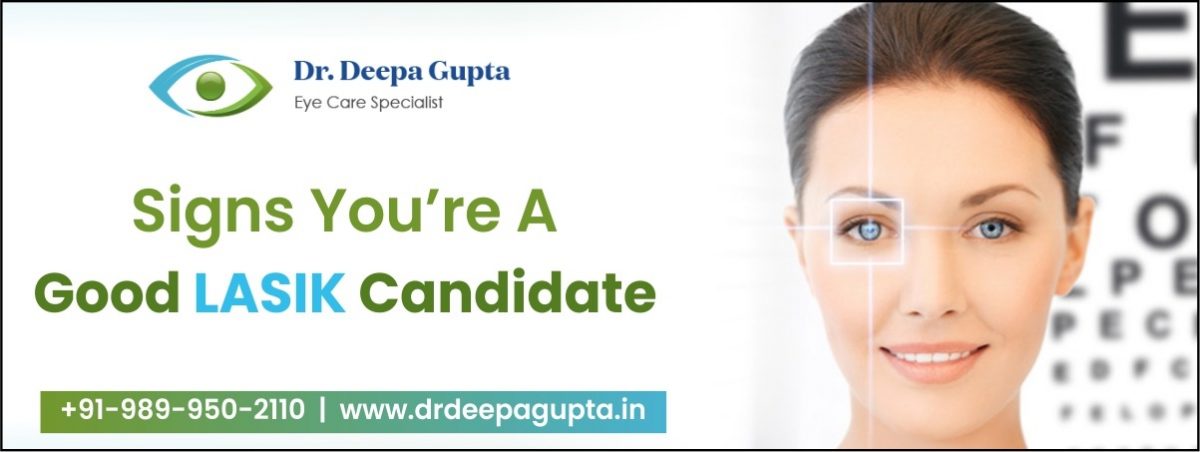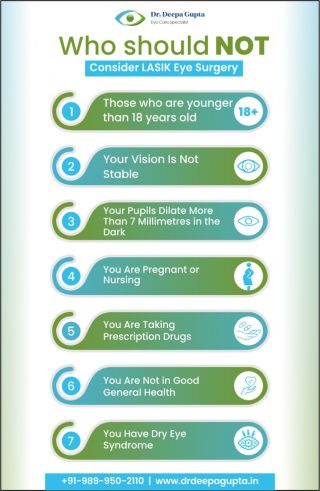Signs You’re A Good LASIK Candidate

At present, LASIK eye surgery is the most common and the best-known refractive laser surgery to correct issues with vision. The LASIK surgery is performed by a LASIK eye surgeon, who uses the laser to correct refractive errors, i.e., when the eye does not refract (bend) the light properly, resulting in blurred vision. It works on the concept of correcting the shape of the cornea so that it is better able to refract light helping in improving vision.
Good candidates for LASIK surgery are individuals suffering from vision problems like Myopia (Nearsightedness), Hypermetropia (Farsightedness), and Astigmatism (change in the shape of eyes). Individuals over 18 years of age with healthy corneas and no other eye disorders are the Best LASIK candidates. A LASIK eye surgery would help them to permanently improve their vision and reduce their dependency on glasses/ contact lenses.
However, LASIK eye surgery for Cataracts is not a recommendation. In cataracts, the lens inside the eyes becomes cloudy, and LASIK will not correct the blurriness caused due to this reason.
Any individual with optical abnormalities like dry eyes, glaucoma, and health conditions like diabetes, does not qualify for the LASIK candidate test.
IF YOU HAVE HEALTHY EYES
Healthy eyes are the most important criteria if one wishes to undergo LASIK eye surgery. Any kind of eye injury or conditions like eye infections, conjunctivitis, and dry eyes can adversely affect the surgery as well as the healing process.
The presence of cataracts and long-standing glaucoma are conditions that are contraindications for LASIK eye surgery.
The cornea of the eyes should be thick and healthy because LASIK eye surgery is based on reshaping the cornea for better vision. LASIK might not be advisable if the cornea is too thin or misshaped due to any disease.
Large pupils may also put the individual at risk of encountering halos and glare, especially at night. A good long-standing prescription for farsightedness or nearsightedness makes an individual a good candidate for LASIK eye surgery. Results of LASIK surgery with very high refractive errors are less predictable and may result in impaired vision.
Your Age Should Be Above 18
Ideally, individuals between 18-and 40 years of age are the best candidates for LASIK eye surgery. Before 18 years of age, the eyes continue to change and grow. During this period, eye surgery for vision correction is not advisable as there is a possibility of a change of prescription. If the surgery is performed during this period, the effects of the surgery may be temporary, and the individual might have to use glasses as soon as the prescription changes.
According to US FDA, individuals over 18 years of age are considered good candidates for LASIK eye surgery. By this time, the refraction stabilizes, and in most cases, the person’s refraction/ prescription does not change after this age. For a successful result, the prescription needs to be stable for at least 1 year.
However, the physiology of the eye changes after 40 years of age. Around that age, most people develop the need for glasses for reading. LASIK eye surgery does not treat this condition and therefore is not recommended for this age group.
You Should Have Stable Vision
Stable vision/ refraction is necessary because LASIK eye surgery aims to improve vision. The purpose of surgery is to improve vision and make the refraction/ vision correction results more stable, long-lasting, and effective. The refraction error to be corrected needs to be stable for at least one year prior to surgery.
If LASIK eye surgery is performed in unstable refraction, the individual might be saddled with glasses or require multiple surgeries.
Also, it’s quite possible that if the prescription is unstable, there may be a disease or some underlying eye infection, making LASIK eye surgery a contra-indication.
If You’re in Overall Good Health
Not everyone is a good candidate for LASIK eye surgery. There are certain physiological conditions in which this surgery is contraindicated.
Individuals suffering from auto-immune disorders like diabetes, arthritis, cataract, and glaucoma are not suitable candidates for LASIK eye surgery. These conditions may result in dry eyes. Under such circumstances, the healing process is delayed and may make the individual more prone to post-surgery infections. Any kind of eye infection and injury also contraindicates LASIK eye surgery. It may make the healing process delayed and lead to corneal scarring.
LASIK eye surgery should not be performed in individuals suffering from dry eye syndrome. Already existing syndrome might lead to discomfort in the eyes and may worsen the already existing syndrome. This might delay the healing process, which might be detrimental in the future.
Conditions like pregnancy and lactation are not the right conditions for undergoing LASIK eye surgery. Hormonal fluctuations might cause changes in vision (nearsightedness/ astigmatism) and dry eyes. Undergoing surgery during this condition might lead to delayed healing, and dryness might make the eyes uncomfortable. Also, the medications prescribed after eye surgery might harm the fetus.
Certain drugs like steroids might interfere with the results and delay the healing process after LASIK eye surgery. Drugs prescribed for Acne may cause increased dryness and cornea scarring after LASIK.
Your Current Eye Prescription Should be Stable
Before undergoing LASIK eye surgery, the current eye prescription should be stable. Any instability in the prescription will make the surgery difficult. The result of the surgery would also be not accurate, and the individual may end up with glasses/ lenses for proper vision.
The individual must have a stable prescription for at least one year prior to surgery to get the maximum benefit of surgery.
TAKE AWAY
LASIK eye surgery is a convenient and successful procedure, but the preparation for surgery and recovery after surgery requires patience.
Age, healthy being, and healthy eyes are the most important criteria for any individual who wants to undergo LASIK. However, with technology changing every day, age might just be a number.
Most LASIK eye surgery procedures are successful and give effective results, but before undergoing any such procedure, the individual must be aware of the potential risks, side effects, and complications.
One should be able to properly weigh their eligibility and expectation while deciding on LASIK eye surgery. A thorough eye examination from an ophthalmologist to decide eligibility for the surgery is of utmost importance before deciding to opt for the same.
FREQUENTLY ASKED QUESTIONS
- How do I know that I am a candidate for LASIK eye surgery?
Before deciding to undergo LASIK eye surgery, you will have to go and meet an ophthalmologist. The doctor will do an initial check-up regarding the condition of your cornea, pupil, and extent of your refractive error. The doctor would be better able to guide you about your eligibility, benefits, risks, and complications involved.
In general
- You should be above 18 years of age,
- Should not be suffering from any chronic ailment
- Should not be pregnant or breastfeeding
- Have healthy eyes
- Have a stable prescription for at least one year prior to surgery.
- What exactly is the procedure for LASIK eye surgery?
The main aim of LASIK eye surgery is to change the shape of your cornea so that it is better able to refract light, thus focusing better on the retina and improving vision.
Following are the steps involved in the surgery:
- The doctor will examine your eyes to ensure that they are healthy enough to be operated on.
- A sedative in the form of eye drops would be introduced in your eyes.
- The doctor will then use a Femtosecond laser to make a thin circular flap in your cornea. This flap, when folded back, will provide access to the underlying cornea.
- Small amounts of the tissue would be removed from the cornea to reshape it with the help of a laser with UV beams.
- In case you are farsighted, the laser will create a deeper cornea. In case you are nearsighted, the laser will create a flat cornea.
- The flap would then be laid back, and the cornea would be allowed to heal naturally.
- Is LASIK eye surgery time-consuming and painful?
Fortunately, NO. This surgery is not time-consuming and is not painful at all. Before the surgery, the surgeon will put a numbing eye drop in your eyes so that you don’t feel any pain. However, you might feel certain pressure during the procedure, but that goes away as you recover.
- When will I see the result of LASIK eye surgery?
Immediately after the surgery, your vision will improve. You will start seeing those things clearly that you could not earlier. Initially, things might appear a little hazy, but the vision improves as the eyes recover.
- What are the side effects/ risk involved with LASIK eye surgery?
The side effects of this surgery are very rare. Some people might experience certain side effects like:
- An impaired nighttime vision such as halos and glare while driving
- Dry eyes
- Inflammation and infection

